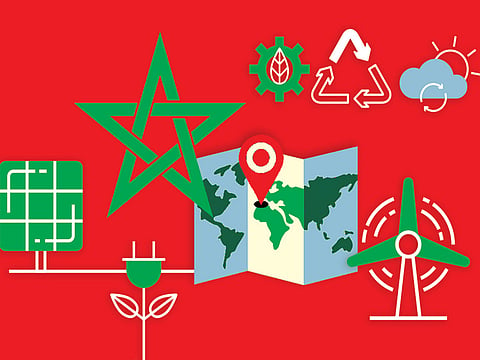Realising Morocco’s renewable energy ambitions
By sharing its national know-how at events such as the one in Abu Dhabi, the country can contribute significantly to help find solutions to global energy challenges

Morocco stands well-equipped to achieve the ambitious renewable energy targets it has set for itself. The kingdom is guided by a realistic national energy strategy, a precise operational roadmap and favourable legislative and financial frameworks. The creation of the Moroccan Agency for Solar Energy (Masen), along with the National Energy Board (NEB), reaffirms the country’s commitment to increase the share of renewable energy in the national energy mix to 42 per cent by 2020.
At COP21 in Paris, Morocco announced an even more ambitious objective: To increase the share of renewable energy in the national energy mix to 52 per cent by 2030. The impact of this announcement has been felt well beyond Morocco’s borders — as one can see by the focus on renewable energy opportunities in North Africa at the ongoing Abu Dhabi Sustainability Week.
The first renewable energy projects in Morocco have now passed the symbolic half-way mark, an impressive feat considering the fact that less than 10 years ago the share of renewables in the country’s energy mix was almost zero.
With the hydroelectric and wind projects now in operation, the projects under development — including solar power plants — by Masen (currently 160MW of installed solar power capacity) and those in design, Morocco is certain to reach its first fixed target: 42 per cent or 6,000MW by 2020.
Piloting various renewable energy projects since 2015, Masen is transforming natural energy into a powerful force of sustainable economic development.
Promotion of technological innovation
In addition to generating electricity and mobilising finance, Masen seeks to catalyse a competitive economy that harnesses existing skills in the local workforce and helps to create new ones. The development of applied research and the promotion of technological innovation are the priorities. The research and development platform at the Noor Ouarzazate Solar Complex is an example of Morocco’s focus on innovation. Another important pillar of Masen’s integrated approach is support for the sustainable growth of the regions hosting renewable energy projects.
Sourcing efficient financing for renewable energy projects has also been a priority for Masen. The package created for the Ouarzazate Solar Complex was based on an innovative financial and legal structure, in accordance with the highest international standards — managing risk and reducing both construction delays and costs.
Masen mobilised nearly €2.2 billion (Dh8.59 billion) to finance the three concentrated solar power (CSP) projects at the Ouarzazate complex. In addition, Masen recently issued the first African Green Bonds worth more than 1 billion Moroccan dirhams (equivalent to about €100 million) to finance the Noor PV I projects (Noor Ouarzazate IV, Noor Boujdour and Noor Laayoune). While Africa has a large energy deficit in the face of growing demand, Europe is confronted with stable energy demand but the need to integrate more renewable energy into its energy mix.
By sharing its national know-how — at events such as Abu Dhabi Sustainability Week — Morocco can contribute significantly to finding solutions to global energy challenges. Its strategic geographical location, reinforced by the electricity grid infrastructures now in place or under development, means that it can be a platform for electricity exchange between Africa and Europe.
Morocco declared its commitment to a sustainable future as host of COP22 in Marrakesh last November. Hailed as the ‘COP of Africa’, the event was an opportunity to reaffirm Morocco’s shared commitment to a sustainable future — where dependence on fossil fuels is reduced, energy-supply secured, socio-economic development stimulated, continuous economic growth unlocked and the planet protected.
Dayae Oudghiri is a management board member at Moroccan Agency for Solar Energy.


